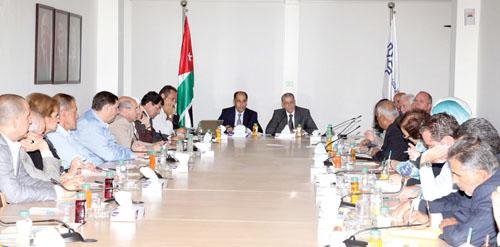You are here
Roadmap for implementation must accompany ‘2025 vision’ — Saif
By Dana Al Emam - Aug 26,2014 - Last updated at Aug 26,2014

AMMAN — Planning Minister Ibrahim Saif on Monday briefed members of the Economic and Social Council (ESC) on the framework of the economic and social policies of the Kingdom’s “2025 vision”.
Saif noted that the 10-year economic blueprint must be accompanied by a parallel implementation programme that functions as a roadmap, taking into consideration Jordan’s economic constraints.
“We must first identify our priorities and the needed investments to sustain Jordan’s infrastructure,” he said, stressing the need for tools that measure the progress in achieving the blueprint’s goals.
The vision’s framework is aimed at boosting institutional stability and developing businesses in the long run, in light of the need for more reforms that boost economic growth and comprehensive development, according to Saif.
“The framework will also consider the gaps in development among governorates and the need to enforce the law equally on everyone,” he said, adding that the Kingdom requires further legislative stability.
The minister mentioned some of the issues that the 2025 vision must address, benefiting from the successful experiences of other countries.
“The vision must study the volume of public spending and the efficiency of public administration, and it must question current public spending policies,” Saif said.
External debt is another issue to be discussed as it nears a “dangerous” level, according to the minister.
He added that the energy, water, transportation and education sectors are the Kingdom’s priorities.
Mukhallad Omari, director of policies and strategies at the Planning Ministry, reviewed some figures on the Kingdom’s development.
“The population of Jordan is expected to reach 10.2 million in 2015,” he said, noting that the economic contribution of those in the workforce aged over 15 reached 41 per cent in 2012.
Omari added that around 38 per cent of the workforce in Jordan is employed in the public sector.
Figures for 2012 indicate that unemployed Jordanians reached around 170,000 people, while foreign workers numbered around 300,000, he said.
Omari warned of the “very low” enrolment percentage of General Secondary Certificate Examination graduates in vocational training, which stands at 3 per cent.
He said there are no Jordanian universities in the ranking of the top 600 universities worldwide, adding that the Jordan University of Science and Technology and University of Jordan are among the top 800 universities globally.
Omari noted that over 100 official documents have been collected to be discussed with several governmental and non-governmental bodies in preparation to draft the 10-year blueprint.
The vision’s framework addresses developing human resources, fiscal policies, business and innovation, infrastructure, social development, decentralisation and development of governorates in addition to justice and legislation.
ESC President Munther Share said the meeting is a continuation of Prime Minister Abdullah Ensour’s recent meeting with ESC board members to discuss the economic blueprint.
Earlier this year, His Majesty King Abdullah directed the government to draft a 10-year economic blueprint to achieve comprehensive economic development and stability.
Related Articles
Planning Minister Ibrahim Saif on Monday highlighted the integrated economic and social policies’ framework associated with Jordan’s “2025 vision”.
Prime Minister Abdullah Ensour on Thursday said that Jordan's “2025 Vision” for the economy currently being prepared will be assessed every three years to take into account the region's unpredictability and global uncertainties.
The government is finalising its 10-year blueprint for the Kingdom's economic and social policies, dubbed "Jordan 2025", which will be ready before the end of this year, Planning Minister Ibrahim Saif said Sunday.











